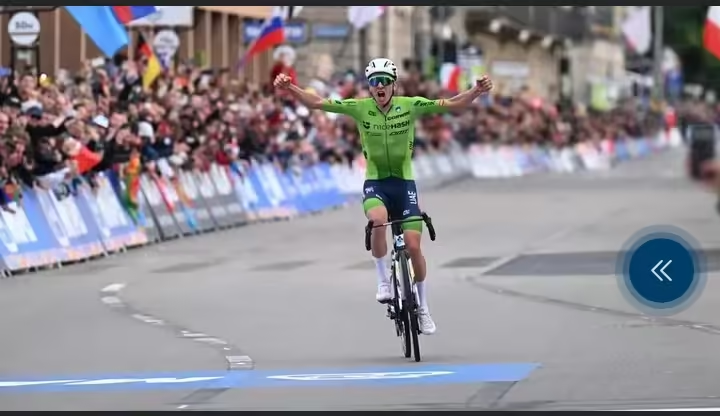Tadej Pogačar’s remarkable achievement in reclaiming the UCI World No. 1 ranking in 2023 is attributed to his relentless racing style and fearless tactics, exemplified by what has been dubbed a “suicide move.” This term, often used to describe a rider’s audacious, high-risk breakaway, fits Pogačar’s approach perfectly. His dominance in the cycling world stems from his unwavering aggression, ability to take calculated risks, and relentless pursuit of victory in every race, regardless of the stakes.
The “suicide move” that defined Pogačar’s 2023 season was most vividly seen in his triumph at key races, including the Tour of Flanders and his nearly successful bid at the Tour de France. The Tour of Flanders, a race known for its brutal cobblestone sections and relentless climbs, was a stage where Pogačar’s strategic brilliance was on full display. Here, his attack in the closing kilometers surprised rivals and spectators alike, as it seemed almost reckless given the intensity of the race. Yet, it was a well-calculated risk. Pogačar’s ability to push himself beyond normal limits, committing fully to long-range attacks when others would hesitate, has become a hallmark of his racing style.
This aggressive mindset not only allowed Pogačar to rack up impressive victories but also built his legend as one of the most exciting and unpredictable riders in the peloton. Even in the 2023 Tour de France, where he finished second behind Jonas Vingegaard, Pogačar’s attacking mentality was never in doubt. Despite battling injuries and fatigue, he continually sought to challenge Vingegaard, attacking on climbs, pushing the pace, and attempting moves that were seen as high-risk. Though he didn’t ultimately win the yellow jersey, Pogačar’s bravery won him admiration from fans and experts, reaffirming his place at the top of the sport.
Pogačar’s willingness to embrace risk in racing has paid dividends, not only in terms of race wins but also in amassing UCI points. His 2023 season saw victories in races like the Amstel Gold Race and Liège-Bastogne-Liège, further securing his status as a dominant force in one-day classics and stage races alike. These victories were often achieved through late-race attacks, where Pogačar would go solo or with a small group, betting on his endurance and strength to outlast the competition.
One of the most compelling aspects of Pogačar’s style is his mental fortitude. His ability to bounce back from setbacks—such as his injury during the Tour de France preparation—speaks to his resilience. In cycling, where physical condition is paramount, the mental strength to persist with daring strategies in the face of adversity is rare. Pogačar’s “suicide moves” aren’t just physical efforts; they are calculated risks that reflect his confidence and deep understanding of race dynamics.
In summary, Tadej Pogačar’s return to the World No. 1 ranking in 2023 was not just about winning races—it was about how he won them. His fearless, aggressive style, marked by bold, often high-risk moves, has cemented his reputation as one of the most exciting cyclists of his generation. The “suicide move,” a term that captures his willingness to risk it all in pursuit of victory, encapsulates what makes Pogačar so special: his combination of raw power, strategic insight, and an unyielding desire to win.
